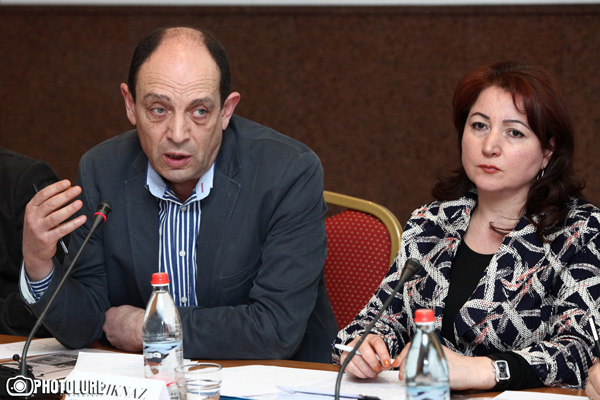The problems related to the provision of overcrowding of the RA Penitentiary Departments, sanitation and housing conditions constantly appear in the Human Rights Defender (HRD) reports. The report for 2015 also highlights this issue. As we have informed, for example, the sewage problem in “Kosh” penitentiary is not resolved, it was reported that the open correctional establishment of “Goris” penitentiary facility has no doors, they are replaced with a net attached to the frame and the cloth curtain. The toilet is located in a semi-wall wooden cabin built by convicts. In “Nubarashen” penitentiary, the sewage water of the cell located in the upper floor is leaking from the ceiling and so on.
Aravot.am asked the Chairman of the Helsinki Committee of Armenia, Avetik Ishkhanyan, whether the RA authorities do not have required funds or they are reluctant to solve these problems. Mr. Ishkhanyan replied, “If there is a wish and the goal to change, then it is in the hundredth place. Actually, this sector is neglected because if desired, it is possible to significantly improve the situation. Funds can always be found and new penitentiaries can be built and enroll new employees. But even without these funds, we can solve the problem of overcrowding. For example, not to exercise so much detention as a preventive measure, not to give so many severe punishments. For example, not to sentence to 3 years imprisonment for the attempt to stealing pigeons.”
According to the HRD, if the RA Ministry of Justice, the penitentiary system were independent, then when the limit is complete, nobody would be enrolled to the penitentiary. Mr. Ishkhanyan is sure that the protection of the rights of the perpetrators is not so essential for the authorities, the prisoners are considered a second-class people. On this occasion, Avetik Ishkhanyan recalled Winston Churchill’s following words: “Show me your prisons and I shall say in which society you live.” This year’s HRD report also covered the issue of reasonable deadlines for the investigation of the March 1 victims.
We asked Mr. Ishkhanyan whether the raised question is in the domain of political or legal dimension, the HRD replied, “The Ombudsman has no right to raise not only a political issue but I am sure that he has not raised a political issue and has remained purely in a legal dimension. But in my interpretation, this is a political issue. No one can convince me that even inadequate professional bodies were unable to reveal the reasons of at least seven victims out of ten. In my opinion, there will be no revelation. I even doubt that anything will be revealed even under the change of power, as any disclosure means the loyalty to the law enforcement bodies, and in Armenia, there is a tradition formed since the 1990s that the law enforcements are the support of the authorities.”
Read also
The HRD report includes an extensive reference to the violence in Baghramyan Avenue on June 22-22 , also against the journalists and the delays in the investigations. Mr. Ishkhanyan views this issue also in the political context and argues, “There should be authorities of another character to resolve these issues.” To our question of what is the role of the ombudsman institute if it cannot restore the rights of citizens pertaining to issues of public sonority, Mr. Ishkhanyan replied, “The ombudsman, in some cases, can only restore the rights of individuals that are not associated with serious political matters but not in the case of major issues. Many people do not realize that this institute is not a judicial system but a quasi-judicial system.”
According to Mr. Ishkhanyan, the institute of the ombudsman operates effectively in the countries where there is an independent judiciary, a rule of law country, and the Ombudsman is an additional support and enjoys great reputation. Avetik Ishkhanyan considers the institute of the ombudsman in our country “better than nothing”, and at the same time, notes that the establishment of this institution was not the desire of the RA society or the authorities but a demand of the Council of Europe.
Tatev HARUTYUNYAN




















































